Farmers markets open with an eye toward safe sales
Farmers markets open with an eye toward safe sales

LEXINGTON, Ky., — In the United States, about 40 percent of farmers are 65 or older according to the U.S. Department of Agriculture’s census. Kentucky reflects that demographic, so when the coronavirus started to emerge in the state, some farmers who were in the elevated risk category and typically sell through farmers markets were a little concerned about how they would safely continue sales this year.
“We’re old, you know,” Leo Keene said, only half joking. Keene and his wife Jean own Blue Moon Garlic Farm in Madison County and sell to restaurants and at the Lexington Farmers Market. They delayed their return to the market this year until May 2. “We just didn’t feel very sure about things. I’m not sure we feel sure about them now, but having endured a couple of markets, we feel better.”
Faced with an unheard-of pandemic, market managers and farmers market boards in big cities and small, rural communities started rethinking how they could open their spring markets while keeping producers and customers safe — many with the help of University of Kentucky Cooperative Extension agents. Before much of the rest of the state even thought about returning to work, market vendors were creating ways to be “healthy at work” to keep their customers supplied with fresh produce, dairy and meat products.
“We never anticipated closing, because people always need food,” said Josh England, manager of Lexington Farmers Market and an alumnus of the UK College of Agriculture, Food and Environment’s sustainable agriculture program. “My goal was always to create an environment where folks could be safe to sell and purchase healthy local food. They weren’t going to take a break (from growing food) because of an international pandemic.”
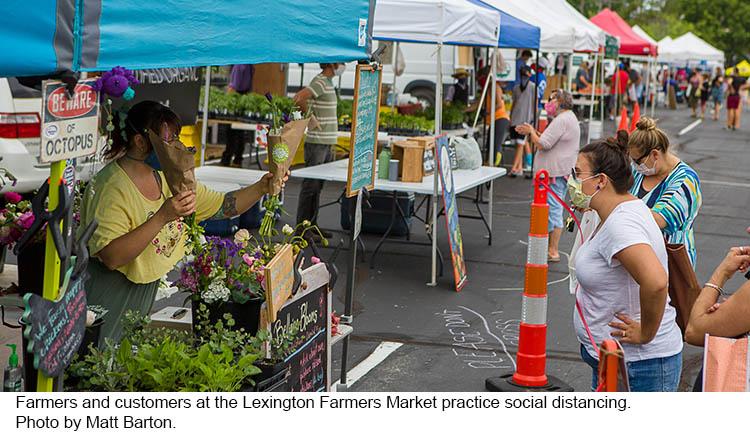
A Safe Design
In Edmonton, where the Metcalfe County Farmers Market sets up outside the Cooperative Extension office on Fridays, extension agents Lynn Blankenship and Brandon Bell worked with the market board to design a system that would reassure patrons that it was safe to shop. They decided to do a drive-thru market that would take advantage of the office’s circular driveway. Customers would have to stay in their cars and vendors would bring products to them. They also implemented an “if you touch it you buy it” policy.
The local health department provided guidelines on gloves, washing hands, sanitizing and handling money. And a few weeks before the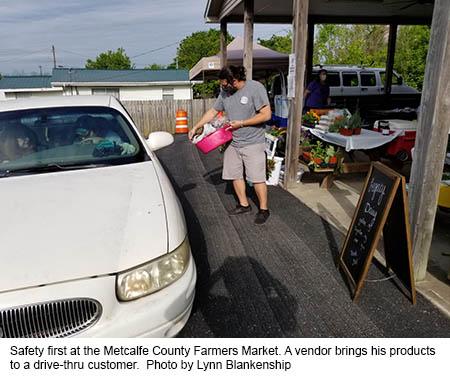 Centers for Disease Control and Prevention recommended masks to slow down the spread of the virus, the market vendors decided to wear them. Blankenship, the family and consumer sciences agent, ordered hands-free towels and soap for the office bathroom and donated hand sanitizer, gloves, bleach and spray bottles she had on hand for her food preparation classes. She mixed up bleach and water bottles for each table, so the vendors could wipe everything down every 30 minutes.
Centers for Disease Control and Prevention recommended masks to slow down the spread of the virus, the market vendors decided to wear them. Blankenship, the family and consumer sciences agent, ordered hands-free towels and soap for the office bathroom and donated hand sanitizer, gloves, bleach and spray bottles she had on hand for her food preparation classes. She mixed up bleach and water bottles for each table, so the vendors could wipe everything down every 30 minutes.
The market opened on April 3. Everyone held their breath. Would people feel safe enough to shop? And when they came, would they follow the rules?
“I was a little worried. We have some pretty independent people in rural Metcalfe County, and I thought perhaps we might have some customers who would balk and want to get out of their car and touch things,” Blankenship said. “But everyone has followed the rules. It’s been amazing. No one’s complaining.”
In fact, the market is booming.
“We compared the numbers from this April with the previous year’s numbers, and our business during this time has more than doubled,” she said.
Respecting the Trust
Back in February in Fayette County, England was doing some figuring of his own. A year-round market, the Lexington Farmers Market’s Saturday market is usually centered around an open-air pavilion in downtown Lexington. On a normal morning, the crowds can grow rather large. Its Sunday market, held in a shopping center parking lot on the south side of the city, also attracts a lot of people. England had to figure out how to space the booths and accommodate hundreds of people at both spots while keeping everyone at a safe distance.
“We want to make sure that we keep the most vulnerable and most susceptible members of our community, our friends, safe,” he said. “I feel like it’s my responsibility to provide a safe and healthy environment for you to make your purchases, because you’re trusting us, and I need to respect that trust.”
Working with Lexington food coordinator Ashton Potter Wright and the local health department, England drew up an extensive plan that he submitted to the Kentucky Department of Agriculture.
“We have tried to be both understanding and helpful,” he said. “We had friends from UK who helped farmers set up online platforms and preordering, and that was really helpful.”
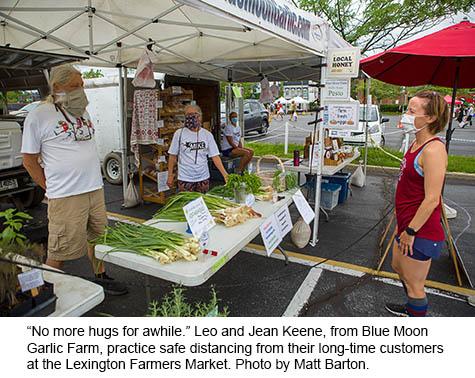 The Keenes were among producers who ventured into online ordering for the first time. Jean Keene handled the online ordering setup.
The Keenes were among producers who ventured into online ordering for the first time. Jean Keene handled the online ordering setup.
“That was part of our strategy,” Leo Keene said. “Make sales as quick and hands-free as possible.”
It hasn’t been a piece of cake, because many farmers, like the Keenes, do not have access to high-speed internet, so the process can be more than frustrating at times. But even with the occasional glitch, the move to online seems to be working to minimize face-to-face contact.
England moved the Saturday market, and also the Tuesday and Thursday markets, into the expansive Rupp Arena parking lot at Lexington Center, now empty because of restrictions limiting large indoor gatherings. This allowed him to spread the booths 10 to 16 feet apart. Each market day, England and his staff chalk circles six feet apart on the ground that indicate where patrons can stand as they wait in line. Hand sanitizer is available, and its use is encouraged. Vendors and customers must wear masks. The staff also limits the number of customers who can be in the market at one time – 135 on Saturdays, 100 at the smaller venue on Sundays.
“We almost have the same number of vendors we normally would have at this time of year. We still have a few vendors who are deciding and weighing the risk of reentering our community, but we’re at about 90% of our vendors right now,” England said.
Though attendance seems to be a bit down so far, he attributes some of that to the one-customer-per-family rule and the colder-than-usual weather.
Keeping the Bonds Intact
The Owensboro Regional Farmers Market delayed its normal April opening until May 16.
“Many of the farmers were feeling like ‘let’s go ahead and go.’ Then again, some of these individuals were in the at-risk category, so there was some hesitation until we could figure out how to do the market safely for all concerned,” said Annette Heisdorffer, extension agent for horticulture education in Daviess County. Heisdorffer often serves as a facilitator for the market, helping them find places to meet and providing them with UK’s latest research- and science-based information.
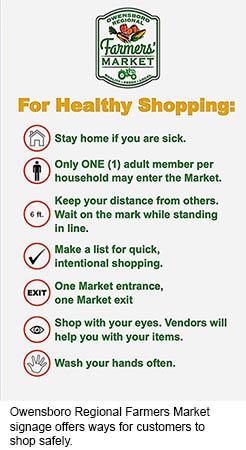 During the weeks-long delay, the market administration made sure to keep the lines of communication open between customers and farmers.
During the weeks-long delay, the market administration made sure to keep the lines of communication open between customers and farmers.
“We put our entire vendor list and contact information on our social media, encouraging people to reach out to the vendors themselves during the time we were not open, just to keep communication open and build bonds between the customer and the vendor,” said Jim Gilles, market board president and a producer who sells meat and dairy products. “
Gilles, who is a UK alumnus with a degree in agricultural economics, said it will be difficult to foster those relationships that a lot of people are used to when shopping at the farmers market, which is typically treated as a social event.
“But I think people understand why we’re having to do what we’re doing,” he said.
Last year was the first full year for the market to occupy a newly built pavilion on Parrish Avenue, but this year the market board decided it would be safer to return to the open air and set up booths in the parking lot instead. They are encouraging only one member of a family to shop and to come with a shopping list, shopping quickly and with their eyes rather than touching items. They are also encouraging folks to pay with cards, rather than cash, though cash is not forbidden.
On opening day, May 16, vendors and customers approved of the setup and the flow. Gilles said everyone complied with the rules and spirits were high. He believes the count will show they had more than 1,500 guests through the market, which is ahead of where they normally are at this time of year.
As markets move deeper into the season in this strange, new world, managers, vendors and agents will tell you it has been and continues to be a learning experience.
“We’re in uncharted waters, just like everybody else is,” Gilles said. “We’re doing our best, following the guidance we’ve been given from the Kentucky Department of Agriculture. We’re asking people to be patient and courteous with us as we navigate this. What happens this Saturday may not look the same next Saturday. We may figure out there’s a lot of things that don’t work or could work better. So just be patient and flexible with us, as we figure it out.”
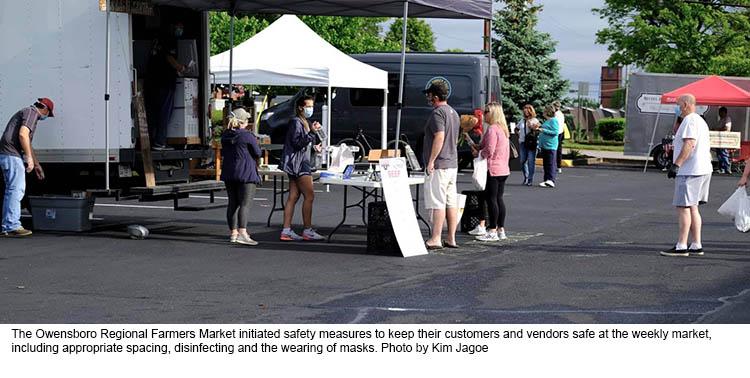
Watch video here.
View photo gallery here.
Agricultural Economics Extension Family & Consumer Sciences Horticulture

